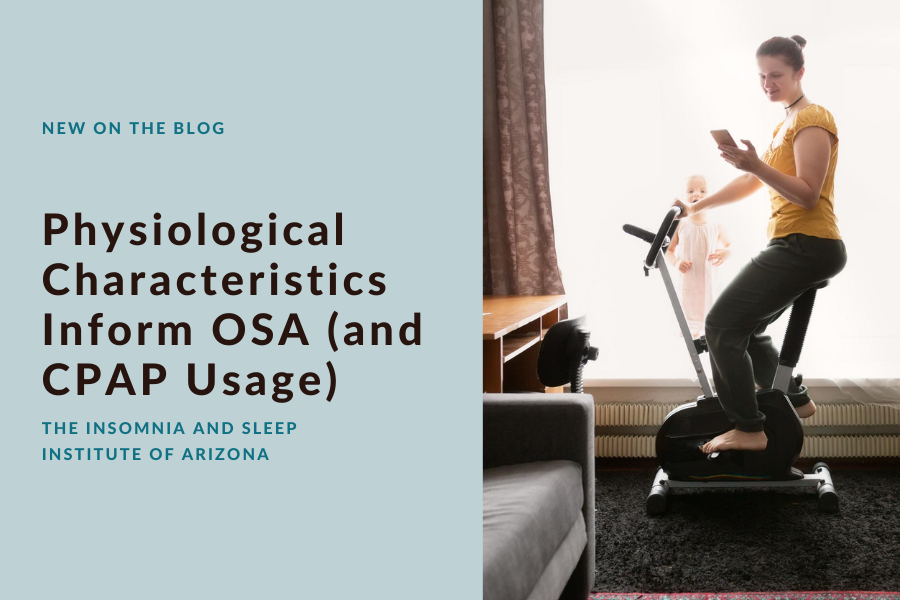Anyone of any age can struggle with obstructive sleep apnea (OSA), the most common type of sleep apnea. In fact, OSA is one of the most common reasons patients seek out The Insomnia and Sleep Institute of Arizona. We are staffed by sleep specialists concentrating in sleep medicine, and are home to the “Top Doc” in the area as voted by peers. Setting the standard for sleep medicine in the Phoenix area, our outcome-driven clinic ensures that you meet with a sleep specialist during your consultation so a quick and correct diagnosis can pave the way for testing and treatment. When it comes to OSA, it’s critical to only work with leading sleep experts for the best outcome.
CPAP therapy remains the gold standard in OSA management and treatment, and CPAP is required prior to any patient being approved for more aggressive therapies like the Inspire implant. There are many causes of OSA (even though anyone can have this sleep disorder), with carrying extra weight being one of the most common factors that makes someone likelier to have OSA. However, a recent study found that there are also physiological traits that increase the likelihood of OSA.
What’s Behind OSA?
The study, published in the American Journal of Respiratory and Critical Care Medicine, found that a lower arousal threshold as well as high or low pharyngeal muscle compensation are both linked to OSA and a lower adherence to CPAP therapy. The research trial included those who had a reported objective CPAP adherence during a two-year period. Polysomnography was used to monitor the arousal threshold, pharyngeal muscle compensation, loop gain, and pharyngeal collapsibility. It turns out that those with a lower arousal threshold (which means they wake up easier) also had a lower CPAP usage rate. Additionally, abnormal pharyngeal muscle compensation (whether low or high) also didn’t use CPAP machines as they should on a regular basis.
Researchers stress that being aware of these physiological characteristics can be helpful in pinpointing those who might not have proper CPAP adherence—and allow for earlier intervention. According to the authors, “Our findings suggest that a prior knowledge of an individual’s OSA pathophysiology may aid with the identification of patients who are at risk of poor CPAP adherence and may improve OSA therapy in a more precise way.”
What this Means for OSA Patients
Does this mean that because a person presents with these physiological traits that they are not a good candidate for OSA therapy? Not at all. While CPAP is the standard OSA treatment, it can be combined with other therapies such as CBT, medication, and perhaps the Inspire implant. Understanding a sleep disorder is a comprehensive and holistic undertaking. That’s why it’s so important to work with sleep experts who can help patients find a solution that works for them.
Going Beyond CPAP for OSA
Many patients who fail CPAP therapy are interested in implant options. Bear in mind that it is required for patients to fail CPAP therapy before being eligible for surgical intervention. However, for those who do qualify for an implant, it can be the best means for managing OSA. An implant “forces” the throat muscles that collapse during sleep to keep the airway open and unblocked.
Treating OSA can be a catch-22 and a vicious cycle. For those whose OSA appears or is worsened by excess weight, having unmanaged OSA can make them too tired to exercise regularly. Of course, routine exercise (along with a healthy diet and good sleep) are critical components in maintaining a healthy weight. Getting OSA under control regardless of other particulars is critical, and sleep experts can help. A full understanding of what causes and exacerbates OSA is important to correctly treat each unique patient.
If you or your child has OSA, or if it is suspected, the sooner you get help the better. Unmanaged, OSA is linked to a variety of conditions ranging from diabetes to stroke and heart disease. Schedule your consultation with a sleep expert today and get on the right path to better sleep. Call The Insomnia and Sleep Institute today to schedule your consultation or, for the fastest response, simply complete the online form.





